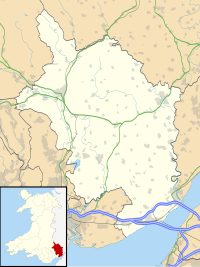St Dingat's Church, Dingestow: Difference between revisions
m →References: Category:CS1 maint: ref duplicates default; remove duplicates; (2× removed; 0× skipped) eval 5 templates: |
m add {{Use dmy dates}} |
||
| Line 1: | Line 1: | ||
{{Use dmy dates|date=April 2022}} |
|||
{{Infobox church |
{{Infobox church |
||
| name = Church of St Dingat |
| name = Church of St Dingat |
||
| Line 75: | Line 76: | ||
==External links== |
==External links== |
||
* {{Commons category |
* {{Commons category-inline|St Dingat's Church, Dingestow}} |
||
{{Church in Wales}} |
{{Church in Wales}} |
||
Revision as of 07:07, 11 April 2022
| Church of St Dingat | |
|---|---|
 "the principal architectural feature in Dingestow" | |
| 51°47′23″N 2°47′18″W / 51.7897°N 2.7884°W | |
| Location | Dingestow, Monmouthshire |
| Country | Wales |
| Denomination | Church in Wales |
| History | |
| Status | parish church |
| Founded | 14th century |
| Architecture | |
| Functional status | Active |
| Heritage designation | Grade II* |
| Designated | 27 November 1953 |
| Architect(s) | Thomas Henry Wyatt, Richard Creed |
| Architectural type | Church |
| Administration | |
| Diocese | Monmouth |
| Archdeaconry | Monmouth |
| Deanery | Monmouth |
| Parish | Dingestow |
| Clergy | |
| Priest(s) | The Reverend G. J. R. Williams |
The Church of St Dingat in Dingestow, Monmouthshire, Wales, is a parish church dating from the 14th century. It is dedicated to Saint Dingat or Dingad, a 5th-century Welsh saint. The church was almost completely rebuilt by Thomas Henry Wyatt in 1846 and further renovated by Richard Creed in 1887–1888. It is an active parish church and a Grade II* listed building.
History
The origins of the church date from the 14th century,[1] though almost nothing remains of this period.[1] In the early 19th century, the Monmouthshire antiquarian Charles Heath described the original church, "it is a mean building and has nothing to attract the eye of curiosity, consisting only of a nave without side-isles".[2] The tower was rebuilt in 1846 by the architect T. H. Wyatt, who worked extensively in Monmouthshire.[1] Later in the 19th century further renovations took place under the supervision of Richard Creed.[1] The church remains an active parish church.[3]
Architecture and description
The church is built of sandstone and puddingstone rubble.[1] It comprises a nave with porch, a North transept, a chancel and Wyatt's tower.[1]
The architectural historian John Newman describes the stained glass as comprising roundels depicting the Lamb of God and symbols of the Four Evangelists.[4] The North transept functions as the chapel of the Bosanquet family of Dingestow Court and contains memorials to members of the family dating from 1806 to 1975.[5]
The church is a Grade II* listed building, its listing recording the building as "the principal architectural feature in the village of Dingestow".[1]
Notes
- ^ a b c d e f g "Listed Buildings – Full Report – HeritageBill Cadw Assets – Reports". cadwpublic-api.azurewebsites.net.
- ^ Heath 1804, p. unnumbered.
- ^ "Churches – The Church in Wales". The Church in Wales.
- ^ Newman 2000, pp. 211–12.
- ^ "ST DINGAT'S CHURCH, DINGESTOW – Coflein". www.coflein.gov.uk.
References
- Heath, Charles (1804). Historical and Descriptive Accounts of the Ancient and Present State of the Town of Monmouth. Monmouth: Charles Heath. OCLC 18491234.
- Newman, John (2000). Gwent/Monmouthshire. The Buildings of Wales. London: Penguin. ISBN 0-14-071053-1.
External links
 Media related to St Dingat's Church, Dingestow at Wikimedia Commons
Media related to St Dingat's Church, Dingestow at Wikimedia Commons

